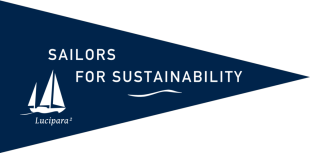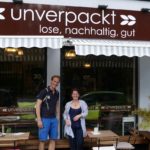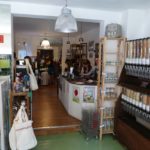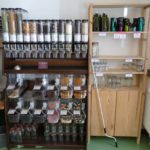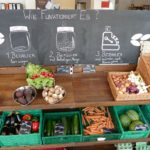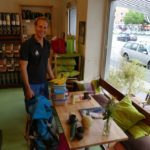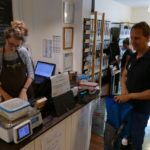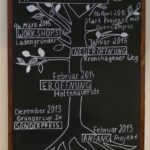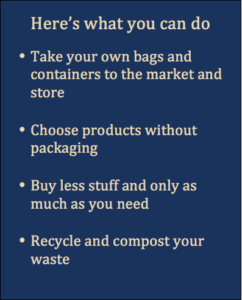Living Without Waste (DEU)
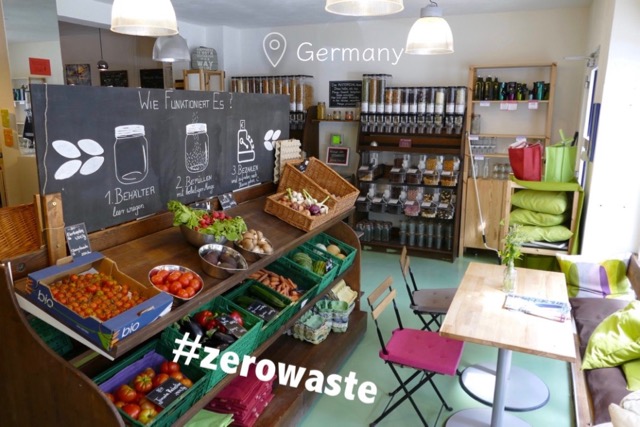
Germany’s first packaging-free grocery store, Unverpackt Kiel, helps consumers reduce plastic and food waste, and stimulates buying local.
Contributes to achieving the following UN Sustainable Development Goals:
We are excited to try a new shopping experience today, one that necessitates some preparation. We are in Kiel, the first foreign destination of our world trip, and on our way to “Unverpackt”, a grocery store that sells everything without packaging. We have to bring our own containers, so we search the boat and put all empty ones in our backpack.
When we arrive at Unverpackt we marvel at what’s on offer. Fresh vegetables are beautifully arranged next to the little bistro section of the shop. The walls are lined with transparent bulk bins filled with nuts, pasta and rice. Chocolates and candy displays invite us to fill our containers up to the lid and large dispensers with detergent and shampoo are waiting for us to press their pumps. We don’t see any item wrapped in plastic. Even toilet paper is sold per roll. Products that are more difficult to sell loosely, such as yoghurt and wine, are offered in glass bottles on which a 20-cent deposit is charged.
Our Own Shopping Experience
Marie Delaperrière, founder of Unverpackt, explains the concept to us and we give it a try. A sign clearly shows how it works: Weigh, Fill, Pay.
We weigh our containers one by one and write the weight at the bottom using a waterproof marker. That way the cashier knows how much weight to subtract from the total weight of the container with selected content. It will also come in handy the next time we shop here – we can then skip this step.
Marie then helps us with ingredients for a delicious meal, couscous with vegetables. It’s not only fun to fill our containers, it also eliminates the need to do this later on the boat. We were used to buying rice, couscous and pasta in plastic packaging and removing that packaging on the boat to fill our jars and containers to save space. Now we can take our purchases from our bag and store them immediately. So actually we save time, too!
Once all our containers our filled and we have picked some loose vegetables, it’s time to pay. The cashier turns each container before weighing it, then decreases the weight with the number we wrote on the bottom of the container. It all goes very swiftly.
Products, not Brands
As everything is offered without packaging, the brands almost disappear. Instead of brands, your senses decide what you buy: you can see, smell and in many cases even touch the food and thus assess the quality. In most cases, that’s not even necessary. There are not ten types of spaghetti from which to choose, but one. Marie has picked the best type, often organic and fair trade. She stands for the quality of the produce. This explains the subtitle of Unverpackt “loose, sustainable, good” (lose, nachhaltig, gut).
Reducing Waste
Marie’s mission is to reduce waste and make people more conscious of the environment and the way we handle food. In her store no products are sold in plastic or packages that can only be used once. She buys everything in bulk to cause as little waste as possible in the purchasing process. Where possible she sources from local producers, so transport and thus the impact on the environment is minimised. Finally, less food is wasted because you can buy exactly as much as you need.
A Growing Trend
Marie opened the store two-and-a-half years ago. This made her the first in Germany to open a store in which items are sold without packaging and where you have to bring your own containers. She started a trend: there are now 22 of these types of stores in Germany. Similar stores exist all over Europe, with London’s Unpackaged being the first in Europe in 2007. For a list of stores, see here. North America will follow soon, with stores to open in Brooklyn and Vancouver.
Success Is not Guaranteed
In the Netherlands the only packaging-free shops (in Groningen and Utrecht) closed within a year. Why does it seem to work at Unverpackt Kiel, we ask Marie. She started out in a small shop, not at a prime location and with a limited range of 200 products, Marie replies. Word of mouth and presentations about life without packaging drew attention to her shop and the concept. She slowly and carefully expanded the shop and evaluated after each extension whether it was a right decision. Nevertheless, it took some time to build a client base. “People have to change their habits”, Marie explains.
Zero Waste as a Lifestyle
Marie’s own changing habits motivated her to set up the shop. “I do this to start a movement, to do something meaningful. If that works, I’m happy.” She was inspired by Bea Johnson, who follows a “zero waste” lifestyle in the US. With her husband and two children Bea only produces one jar waste per year that cannot be recycled or composted. Her lifestyle and book “Zero Waste Home” have made her the guru of the waste-avoidance movement. Its followers act in accordance with five steps: Refuse, Reduce, Reuse, Recycle, Rot (in that order). That means you avoid products and packaging that you do not need, you reduce what you do need (for example, by purchasing the right amount), and disposables are replaced by reusables. All of these steps obviously save energy and raw materials. Only when waste still remains, it is recycled and composted. According to Béa this can lead to more meaningful life in which experiences instead of stuff are central, as she explains in the video below.
It is a drastic break with what has become common practice in societies based on consumerism and economic growth. Yet reducing packaging and food waste can be a very effective way to protect the environment. It does not have to be difficult. See below what you can do or get some tips from blogger Shia aka Wasteland Rebel.
We’re Convinced!
If people join the cause, we have the ability to save resources and reduce energy use and emissions. It is our behaviour that we need to adapt and which ultimately determines our collective success. Anyone who dares to change can bring about positive change. There are already companies that stimulate such behavioural change, as Marie proves with her Unverpackt store in Kiel. Her message is simple: “Even small seeds can turn into trees and forests. Do not complain and wait for someone else to do something, but do it yourself. Your actions can lead to a movement.”
Bags filled and groceries paid, we say to goodbye to Marie and leave inspired by this pioneer of the zero waste movement in Germany. She has definitely planted a seed with us. Many weeks later, we still enjoy the good memory of Marie, her nice store and the great food when we open our containers with muesli, couscous and crisps.
Related Sustainable Solutions

Circular Materials (NZL)
Waste does not exist in nature. Which circular materials can we use instead of plastic, so we can reduce human-produced waste?

Food Recue (NZL)
We meet organisations that lead the way in reducing food waste and learn that all of us have a responsibility to tackle this global challenge.

Fair Fashion (ALB)
In Albania, we meet Pitupi, which makes “people-to-people”clothing. Environmental and social values are as least as important as financial profit.

Local Currency (ITA)
We sail to Sardinia to visit the local currency Sardex. Could this be a more sustainable monetary alternative suitable to support a circular economy?

Mondragon Cooperatives (ESP)
At Mondragon, employees are owners, salaries and profits are fairly distributed, there is solidarity among cooperatives, and education is held in high esteem.
